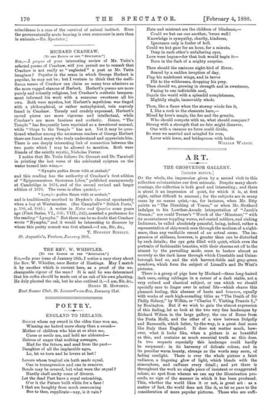RICHARD CRASHAW.
[To THE EDITOR OF THE "SPECTATOR.") STR,—A propos of your interesting review of Mr. Tutin's selected poems of Crashaw, will you permit me to remark that Crashaw is not really so "neglected" a poet as Mr. Tutin imagines ? Popular in the sense in which George Herbert is popular, he may not be ; but I venture to think that the melli- fluous verses of Crashaw can claim as many true admirers as the more rugged stanzas of Herbert. Herbert's poems are more purely and robustly religions, but Crashaw's aasthetic tempera- ment informed his work with a sensuous sweetness all his own. Both were mystics, but Herbert's mysticism was tinged with a philosophical, or rather metaphysical, vein scarcely found in Crashaw. Tersely and crudely expressed, Herbert's sacred pieces are more vigorous and intellectual, while Crashaw's are more luscious and wsthetic. Hence, "The Temple" has frequently been reprinted as a devotional manual, while "Steps to the Temple " has not. Yet it may be ques- tioned whether among the numerous readers of George Herbert there are found many who truly understand and appreciate him. There is one deeply interesting link of connection between the two poets which I may be allowed to mention. Both were friends of the saintly mystic, Nicholas Ferrar.
I notice that Mr. Tutin follows Dr. Grosart and Dr. Turnbull in printing the last verse of the celebrated epigram on the water turned into wine,— " Nymphs pudica Deum vidit et erubuit," and this reading has the authority of Crashaw's first edition of " Epigrammatnm Sacrorum Liber," published anonymously at Cambridge in 1631, and of the second revised and larger edition of 1670. The verse is often quoted,— " Lympha pudica Deum vidit et erubnit," and is traditionally ascribed to Dryden's classical spontaneity when a boy at Westminster. (See Campbell's 'British Poets," p. 198, ed. 1841.) A writer in Notes and Queries some years ago (First Series, VI., 358; VIII., 242), asserted a preference for the reading " Lymplia." But there can be no doubt that Crashaw wrote "Nympha," and it would be interesting to discover by whom this pretty conceit was first altered.—I am, Sir, (to.,


































 Previous page
Previous page